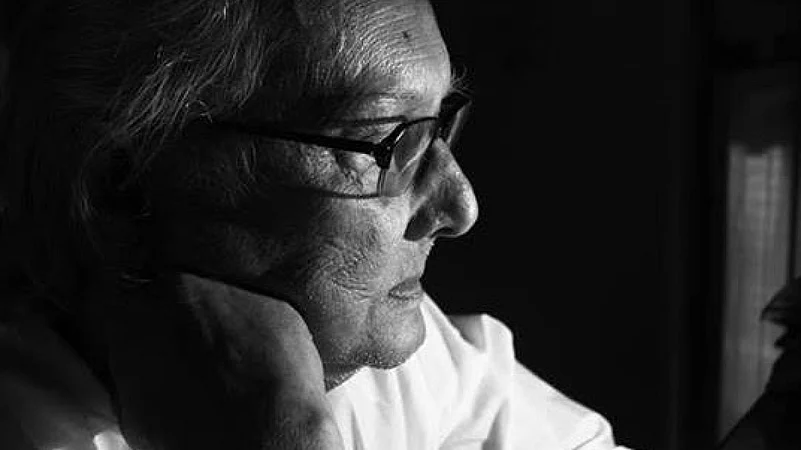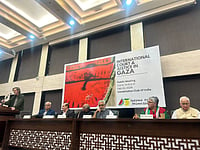An end of an era. The one-man comics industry; eminent Bengali visual artist Narayan Debnath passed on Tuesday morning at a private hospital, three years and a few months short of his 100th birthday. He breathed his last at a private hospital in Kolkata after fighting prolonged illness for weeks He was 96. The legendary Indian visual artist was the creator of the popular Bengali comic characters -- ‘Batul The Great’, ‘Handa Bhonda’ and ‘Nonte Fonte’ -- and his funnies captured generations of Bengali households in awe. Over the years, his comic strips have attained a cult for nearly six decades.
The first and only Indian comic artist to have received a D.Litt degree, Debnath holds the record for the longest-running comic -- Handa Bhonda (1962)-- by an individual artist. The comic has been popular for nearly 53 years now.
A recipient of the Padma Shri award (2021), he was also conferred with the Sahitya Akademi Award and Banga Bibhushan Award in 2013. Debnath had spent most of his life in Shibpur, Howrah district, where he was born. Before his birth, his family had migrated from Bikrampur in Bangladesh.
Hailing from a family of jewellers, Debnath had developed an interest in visual art at a very early age. He was pursuing his higher studies at the Indian Art College for five years during the time of World War II. However, he discontinued his fifth year and began doing freelance with multiple advertising agencies. Debnath, who started off as a calligrapher in the 1950s, came across eminent personalities associated with the press and various publishing houses, back then during his stint as a freelancer. From 1950 to 1961 he illustrated a number of children's books including adventure novels and translated Western classics, while his own journey with comics began in 1962 with Handa Bhonda, in Shuktara (a Bengali magazine for children).
Popular comic strips of Debnath
Handa Bhonda became an instant success and was initially pencilled and inked by Debnath. It was much later when it started to come out in coloured in ink. The push towards working in Bengali comics was first given to Debnath by the editors at 'Deb Sahitya Kuthir' publishing house. In fact, the name of the comic was also said to have been suggested by them. At that time, Bengali comics was yet to make a mark in the world of cartoons. The comic features two young boys, Handa (the slender one) and Bhonda (the stout one), and how the mischievous Handa always ends up being punished after trying to trick Bhonda, who is always a calm and good lad.
Batul The Great (1965), was Debnath’s first coloured-comic strip. It first appeared in the Bengali Baishak issue of Shuktara in 1965. The vest-and shorts clad superhero in red and black was apparently influenced by his friend and famous Bengali bodybuilder Manohar Aich (1912-2016) and it did not take Debnath too long to sketch the protagonist. The character was eventually flared up by the war effects of the 1971 Bangladesh Liberation war. The protagonist of the comic, Batul, was portrayed as a superhero, who could take criminals by their collar. It was also said to have been inspired by the famous comic character Desperate Dan drawn by English cartoonist, Dudley D. Watkins.
Debnath's creation of Nonte Fonte in 1969 also became a huge hit among children, which featured the antics of boarding schoolmates Nonte and Fonte. The comic strip was later turned into a book and recreated in colour in 2002. It was first published in Kishore Bharti, a Bengali publication for children.
A genre influenced by nationalism
When Batul’s character first played up in Debnath’s mind, he had very little idea how the character would turn out like. A heroic muscleman with a 40-inch chest, Batul’s character later became reminiscent of the all-powerful Indian vanquishing his enemies (the Pakistan Army); the theme of which was rooted in nationalism during the 1971 Bangladesh Liberation War. A superhero, he was able to take on tanks, aircraft, and missiles while bullets began to bounce off of him.
Rooted in the spirits of nationalism, it was the editors of Dev Sahitya Kutir, who urged Debnath to add a layer of aura and invincibility to Batul’s heroism.
Other work
Artists and painters have long called for preserving the comic strips of Debnath.
Debnath’s other works include Patalchand the Magician (created in 1969), Bahadur Beral (created in 1982), Danpite Khadu aar tar Chemical Dadu (created in 1983), and Petuk Master Batuklal (created in 1984), which became the last of Debnath’s creation.
Earlier, he created Rabi Chobi -- a comic strip that was published in May 1961 in children's magazine Anandamela to mark the birth centenary of Rabindranath Tagore.
However, Debnath’s work, like Herge’s with Tintin, has not been handed over to others to continue.
Leaders and artists mourn loss
Condoling the death, Prime Minister Narendra Modi said Debnath brightened several lives through his works, cartoons and illustrations.
Governor Jagdeep Dhankhar, who visited Debnath at his home last month, said his death was a huge loss to the world of literary creativity and comics.
"Sad at demise of Padma Shri #NarayanDebnath legendary cartoonist and creator of immortal characters Bantul the Great, Handa-Bhonda, Nonte-Fonte for children's world. Huge loss to the world of literary creativity and comics. My thoughts are with his family, friends and fans," he tweeted.
Chief Minister Mamata Banerjee said Debnath's passing away is an immeasurable loss.
"Extremely sad that the noted litterateur, illustrator, cartoonist, and creator of some immortal characters for children's world, Narayan Debnath is no more. He had created Bantul the Great, Handa-Bhonda, Nonte-Fonte, figures that have been etched in our hearts for decades," she said.
“He gave joy and inspiration to generations of children from Bengal through his cartoon characters. His death is a loss to Bengali literature and particularly children literature,” noted painter Shuvaprasanna said, according to a national media.
The cartoonist's younger son Tapas Debnath told reporters that he would urge the government to help preserve his works. "We would like to urge the government to help preserve my father's works, a treasure trove, for the future generations," he said.
Debnath is credited to have first introduced the concept of comic-strip in Bengali literature


























